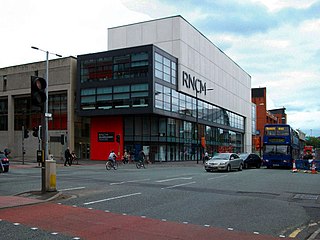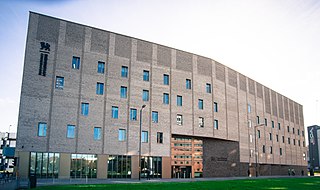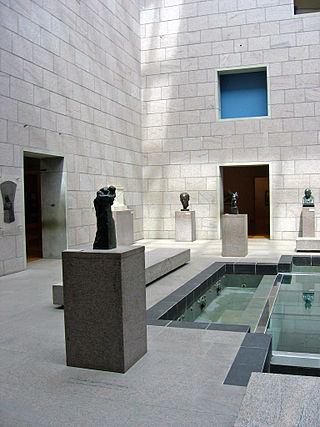
The Royal College of Music is a conservatoire established by royal charter in 1882, located in South Kensington, London, UK. It offers training from the undergraduate to the doctoral level in all aspects of Western Music including performance, composition, conducting, music theory and history, and has trained some of the most important figures in international music life. The RCM also undertakes research, with particular strengths in performance practice and performance science.

Marie-Juliette Olga "Lili" Boulanger was a French composer and the first female winner of the Prix de Rome composition prize. Her older sister was the noted composer and composition teacher Nadia Boulanger.

The Royal Northern College of Music (RNCM) is a conservatoire located in Manchester, England. It is one of four conservatoires associated with the Associated Board of the Royal Schools of Music. In addition to being a centre of music education, RNCM is one of the UK's busiest and most diverse public performance venues.

European Union culture policies aim to address and promote the cultural dimension of European integration through relevant legislation and government funding. These policies support the development of cultural activity, education or research conducted by private companies, NGO's and individual initiatives based in the EU working in the fields of cinema and audiovisual, publishing, music and crafts.
Jacques Hétu was a Canadian composer and music educator. He is the most frequently performed of Canadian classical composers, both within Canada and internationally.
The International Music Council (IMC) was created in 1949 as UNESCO's advisory body on matters of music. It is based at UNESCO's headquarters in Paris, France, where it functions as an independent international non-governmental organization. Its primary aim is to facilitate the development and promotion of international music-making.

The Israel Music Institute (IMI) is a non-profit organization supported by the Israel Ministry of Education and Culture. The institute was established in 1961 by the Public Committee for Arts and Culture, with the aim of publishing and promoting Israeli art music at home and abroad. IMI also serves as the Israel Music Information Center- a member of the International Association of Music Information Centers (IAMIC), maintaining reciprocal ties with some 40 member countries.

The Royal Birmingham Conservatoire is a music school, drama school and concert venue in Birmingham, England. It provides education in music, acting, and related disciplines up to postgraduate level. It is a centre for scholarly research and doctorate-level study in areas such as performance practice, composition, musicology and music history. It is the only one of the nine conservatoires in the United Kingdom that is also part of a faculty of a university, in this case Arts, Design and Media at Birmingham City University. It is a member of the Federation of Drama Schools, and a founder member of Conservatoires UK.
Jeunesses Musicales International (JMI) is the largest non-governmental youth music organisation in the world, created in Brussels, Belgium in 1945, with the mission to "enable young people to develop through music across all boundaries". JMI has established four priority activity fields: Young Musicians, Young Audiences, Youth Empowerment and Youth Orchestras & Ensembles.

Cultural policy is the government actions, laws and programs that regulate, protect, encourage and financially support activities related to the arts and creative sectors, such as painting, sculpture, music, dance, literature, and filmmaking, among others and culture, which may involve activities related to language, heritage and diversity. The idea of cultural policy was developed at UNESCO in the 1960s. Generally, this involves governments setting in place processes, legal classifications, regulations, legislation and institutions which promote and facilitate cultural diversity and creative expressions in a range of art forms and creative activities. Cultural policies vary from one country to another, but generally they aim to improve the accessibility of arts and creative activities to citizens and promote the artistic, musical, ethnic, sociolinguistic, literary and other expressions of all people in a country. In some countries, especially since the 1970s, there is an emphasis on supporting the culture of Indigenous peoples and marginalized communities and ensuring that cultural industries are representative of a country's diverse cultural heritage and ethnic and linguistic demographics.

Maria Guinand is an internationally renowned choral conductor.
International Federation for Choral Music (IFCM) is an international association founded in 1982 to facilitate communication and exchange between choral musicians throughout the world.
The European Union of Music Competitions for Youth (EMCY) is a European umbrella organisation for about fifty national and international music competitions for young people. Founded in the 1960s in order to develop the musical education of young Europeans, EMCY arranges concerts, broadcasts, tours, award ceremonies, master classes and courses for competition prize winners throughout Europe.

Ana María Raga is a Venezuelan musician, choir and orchestra director, pianist, arranger, composer and teacher. She has won national and international prizes in the field of choral singing. She is the founder and president of the Aequalis Foundation.
Richard Albert Letts is an music advocate and administrator.

Making Music is a UK membership organisation for leisure-time music groups of all musical genres, representing over 200,000 musicians and promoters of all levels and experience. Making Music provides them with practical services, guidance, artistic development opportunities and a collective voice for advocacy.
The Creative Industries Federation (2014-2021) was a national organisation for all the UK's creative industries, cultural education and arts. It advocated for the sector, aiming to ensure that the creative industries were central to political, economic and social decision-making.
The European Association for the Education of Adults (EAEA) is a European NGO whose purpose is to link and represent European organisations directly involved in adult learning. The main focus is to promote adult learning and access to and participation in non-formal adult education for all, particularly for groups currently under-represented. EAEA aims at influencing EU policies on non-formal adult education and lifelong learning and cooperates with the institutions of the European Union and with international organisations as the Council of Europe, the International Council for Adult Education (ICAE) and UNESCO.
The European Composer and Songwriter Alliance (ECSA) is an international, non-profit organization based in Brussels and composed by more than 55 associations of composers and songwriters in more than 25 different European countries. It represents around 30,000 music creators and was founded in 2007. ECSA is co-financed by the Creative Europe Programme of the European Union.









